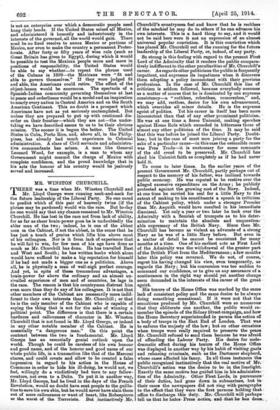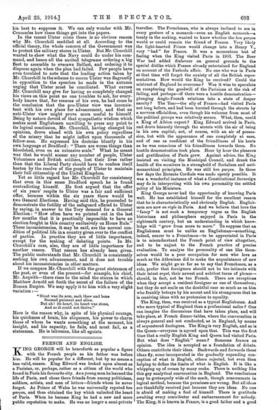MR. WINSTON CHURCHILL.
MITERE was a time when Mr. Winston Churchill and I- Mr. Lloyd George were running neck-and-neck for the future leadership of the Liberal Party. No one cared to predict which of this pair of heavenly twins (if the phrase may be pardoned) would win the race. But to-day no one would say that any chance remained to Mr. Winston Churchill. He has lost in the race not from lack of ability, for as far as sheer brain-power goes he is undoubtedly the abler man of the two; indeed, he is one of the ablest men in the Cabinet, if not the ablest, in the sense that be has just a touch of genius which lifts him above most of his colleagues. Nor is it from lack of experience that be will fail to win, for few men of his age have done as much as Mr. Churchill has done. He has travelled East and West and South; he has written books which alone would have sufficed to make a big reputation for himself if he had not made a bigger one as a politician. Above all, he is physically a man of well-nigh perfect courage And yet, in spite of these tremendous advantages, a brain-power far above the ordinary and an almost un- rivalled experience of men and of countries, he lags in the race. The reason is that his countrymen distrust him even more than they do any of his colleagues. It is not that other members of the Cabinet are necessarily more indif- ferent to their own interests than Mr. Churchill ; or that he is the only member of the Cabinet who is capable of saying the thing that is not for the sake of winning a political point. The difference is that there is a certain hardness and callousness of character in Mr. Winston Churchill that is not found in Mr. Lloyd George, or indeed in any other notable member of the Cabinet. He is essentially "a dangerous man." On this point the contrast between the two is fundamental. Mr. Lloyd George has an essentially genial outlook upon the world. Though he could be careless of his own honour and good name, and of the honour and good name of our whole public life, in a transaction like that of the Marconi shares, and • could create and allow to be created a false impression in regard to his action in the House of Commons in order to hide his ill-doing, he would not, we feel, willingly do a vindictively bad turn to any fellow- creature, not even to a Duke. To put it in another way, Mr. Lloyd George, had he lived in the days of the French Revolution, would no doubt have sent people to the guillo- tine to save his own skin, but he would never have slain them out of mere callousness or want of heart, like Robespierre or the worst of the Terrorists. But instinctively Mr. Churchill's countrymen feel and know that he is reckless of the mischief he may do to others if he can advance his own interests. This is a hard thing to say, and it would not be said here were it not an expression of an almost universal popular conviction. It is this conviction which has placed Mr. Churchill out of the running for the future leadership of the Liberal Party, or, indeed, of any party.
So strong is this feeling with regard to the present First Lord of the Admiralty that it renders the public compara- tively indifferent to the other peculiarities of Mr. Churchill's career. As regards other politicians the public is frequently impatient, and expresses its impatience when it discovers them adopting a policy inconsistent with their previous professions. In the case of Mr. Churchill this line of criticism is seldom followed, because everybody assumes as a matter of course that he is dominated by one supreme consistency—a " ruthless, relentless, remorseless," and, we may add, restless, desire for his own advancement, which overrides all minor details. He is the supreme egoist of politics. Yet his career in itself has been more inconsistent than that of any other prominent politician. He was at one time a fierce Unionist, making speeches ' against Home Rule which exceeded in bitterness those of almost any other politician of the time. It may be said that this was before he joined the Liberal Party. Doubt- less; but in the case of most men joining a party for the sake of a particular cause—in this case the ostensible cause • was Free Trade—it is customary for some remnants of the old creed to be preserved. Mr. Churchill has shed his Unionist faith as completely as if he had never held it.
To come to later times. In the earlier years of the present Government Mr. Churchill, partly perhaps out of respect to the memory of his father, was inclined towards public economy. He was reputed to be restive over the alleged excessive expenditure on the Army ; he publicly protested against the growing cost of the Navy. Indeed, at one time he carried his zeal for a little Navy to the extent of making to his constituents a speech in criticism ' of the Cabinet policy, which under a stronger Premier than Mr. Asquith would have resulted in his immediate dismissal. Yet only a year or two later he took over the Admiralty with a flourish of trumpets as to his deter- • mination to maintain the absolute and unquestion- able supremacy of the British Navy. Since then Mr. Churchill has become as violent an advocate of a strong Navy as he was of a little Navy before. But even in a matter of detail he cannot be consistent for many months at a time. One of his earliest acts as First Lord of the Admiralty was the withdrawal of the greater part of the British Fleet from the Mediterranean; a few months later this policy was reversed. We do not, of course, ' regret his having changed his view, even temporarily, as regards the Navy ; but his conversion was too sudden to command our confidence, or to give us any assurance of a continuance in the right way should yet another change seem demanded in the interests of the career of the great egoist. His tenure of the Home Office was marked by the same lack of consistent policy and the same desire to be always doing something sensationaL If it were not that the sensations produced by Mr. Churchill were so numerous that they obliterate one another, the public would re- member the episode of the Sidney Street campaign, and how the Home Secretary superintended in person the action of a body of troops in the East End of London. That was to enforce the majesty of the law; but on other occasions when troops were really required to preserve the peace Mr. Churchill refused to send them because he was afraid of offending the Labour Party. His desire for melo- dramatic effect during his tenure of the Home Office was displayed in another way by his habit of visiting gaols and releasing criminals, such as the Dartmoor shepherd, whose cases affected his fancy. In all these instances the public recognized instinctively that the real motive of Mr. Churchill's action was the desire to be in the limelight. Exactly the same motive has guided him in his administra- tion of the Admiralty. Other First Lords, in pursuance of their duties, had gone down in submarines, but in their cases the newspapers did not ring with paragraphs to the effect that they were the first persons holding that office to discharge this duty. Mr. Churchill will perhaps tell us that he hates. Press notice, and that he has done.
his best to suppress it.- We can only wonder with Mr. Crummles how these things get into the papers.
In the recent Ulster crisis there is no obvious reason why Mr. Churchill meddled at all. According to the official theory, the whole concern of the Government was to protect the military stores in Ulster. But Mr. Churchill wanted to show what the Navy could do under his com- mand, and hence all the excited telegrams ordering a big fleet to assemble to overawe Belfast, and ordering it to disperse again when the plan had failed. Few people have even troubled to note that the leading action taken by Mr. Churchill in the scheme to coerce Ulster was flagrantly in opposition to the speeches he made in the autumn urging that Ulster must be conciliated. What excuse Mr. Churchill may give for having so completely changed his views on this point no one troubles to ask, for every- body knows that, for reasons of his own, he had come to the conclusion that the pro-Ulster view was inconsis- tent with his own plans for advancement, and that an anti-Ulster view might prove more useful to himself. Being by nature devoid of that sympathetic wisdom which makes most Englishmen unwilling to press any point to its logical conclusion, Mr. Churchill, having changed his opinions, drove ahead with his own policy regardless of the misery that he might inflict upon thousands of fellow-men. He expressed his doctrine bluntly in his own language at Bradford : " There are worse things than bloodshed, even on an extensive scale." What he meant was that he would sooner any number of people, Ulster Volunteers and British soldiers, lost their lives rather than that the Liberal Party should have to confess itself beaten by the resolve of the people of Ulster to maintain their full citizenship of the United Kingdom. Yet so little regard has Mr. Churchill for consistency that even in this same Bradford speech he is found contradicting himself. He first argued that the offer of six years' respite to Ulster was a fair and sufficient offer, because within the six years there would be two General Elections. Having said this, he proceeded to demonstrate the futility of the safeguard offered to Ulster by saying, in answer to the Tory demand for a General Election : " How often have we pointed out in the last few months that it is practically impossible to have an election fought in this country exclusively on Home Rule." These inconsistencies, it may be said, are the normal con- dition of political life in a country given over to the conflict of parties. In practice they are of little importance, except for the making of debating points. In Mr. Churchill's case, also, they are of little importance for another reason. That reason has already been given. The public understands that Mr. Churchill is consistently seeking his own advancement, and it does not trouble about his inconsistencies in other matters.
If we compare Mr. Churchill with the great statesmen of the past, or even of the present—for example, his chief, Mr. Asquith—there rises to the mind the stanza in which Matthew Arnold set forth the secret of the failure of the Roman Empire. We may apply it to him with a very slight variation "Stout was its arm, each thew and bone
Seemed puissant and alive. But ah its heart, its heart was stone, And so it could not thrive."
Here is the reason why, in spite of his physical courage, his quickness of brain, his eloquence, his power to charm those of whom he wants something at the moment, his insight, and his capacity, he fails, and must fail, as a statesman. He is inhuman, like all egoists.



























































 Previous page
Previous page